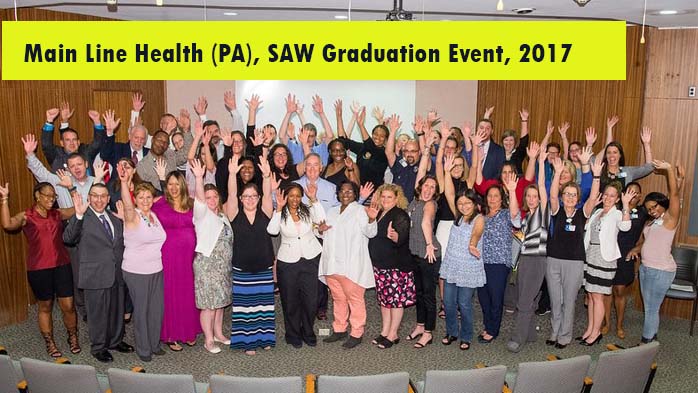Main Line Health in metro Philadelphia has been recognized by the ANCC and U.S. News & World Report as one of the top health care systems in the country.The organization aims to provide the highest quality and most compassionate healthcare possible to patients and their families. To accomplish this, Main Line Health has included strategies for advancing a group that touches patients frequently, but is often overlooked – frontline workers.
Frontline employees are the largest associate group at Main Line Health and are an incredibly diverse population. Main Line Health CEO Jack Lynch has been outspoken and intentional about achieving more diversity at the leadership apex of the health system. According to Lynch, the workforce has been diverse overall, but not in terms of job categories and pay.
“There’s a problem in healthcare with the approach we’ve taken in the past to have diverse leadership teams with everyone competing for a small pool of external candidates,” Lynch said. “If we’re going to develop more diverse team leaders, we have to grow our own. Top to bottom, employees must see opportunity. We want all employees to know Main Line Health is interested in their growth.”
Lynch believes in investing in programs that promote diversity, foster collaboration, participation and respect in the organization, while reducing turnover costs. Under his direction, Main Line Health’s Human Resources and Diversity, Respect & Inclusion Strategy teams took a deliberate step in 2013 to develop leaders within the organization who mirror its patient population, as well as the demographics of Philadelphia. With many Baby Boomers retiring soon, leadership development was also crucial to building a base of engaged workers for the future.
Main Line Health partnered with Catalyst Learning to implement “School At Work” (SAW) and “Expanding Your Career and Healthcare Opportunities (ECHO)”, programs that aid in the career development goals of entry and mid-level healthcare employees. Main Line Health’s goal is to begin building a pipeline for a more inclusive leadership team.
Both SAW and ECHO sharpen key behavioral skills to optimize employee performance and put them on a path for career advancement in healthcare. Modules such as “Principles of Patient Satisfaction and Safety” help employees understand their link to and accountability form the success of the health care system.
Along with SAW and ECHO, Main Line Health instituted a Career Advisor program, giving frontline associates access to an advisor who assists them in pursuing new roles and exploring opportunities for up to one year. Main Line Health’s HR team has found this added layer of support helps employees overcome obstacles they may face when applying for other positions. Career Advisors, for example, help SAW and ECHO participants navigate internal HR systems and bring greater awareness to employee benefits such as tuition reimbursement.
Employee Advancement Programs have Positive Impact
Main Line Health’s Talent Management Team tracks employment patterns and measures the impact of employee advancement strategies like SAW, ECHO and Career Advisor. Associate Administrator Jameyshia Franklin says her goal for leadership training programs is for frontline employees to have better visibility of opportunities available in the health care system. She also values seeing employees gain confidence as they develop a better understanding of their strengths. With more self-assurance, Franklin says, employees are more willing to speak up about ways to improve processes and be part of solutions that benefit Main Line Health patients. “These programs encourage participants to discover new interests, pursue growth and development opportunities, and be more open to new things,” said Franklin.
Employee satisfaction has also improved among SAW and ECHO participants. Chris Robinson, a recent SAW graduate who reports to Franklin, worked in Environmental Services but had a goal to move up within Main Line Health. Robinson wanted to be more involved with patients and their families. Robinson’s initiative led him into a position at the reception desk, where positive interactions with patients and families are vital. Robertson credits SAW for giving him confidence in a new role. “I thought I wouldn’t be able to do it. It was a struggle, but it was worth it. SAW helped me think about what I really wanted to do,” said Robinson. Robinson’s success was acknowledged with the Genuine Excellence Moment (GEM) award, which recognizes employees who exhibit the excellence, innovation, integrity and communication values of the organization. Dominic Kayatta, Manager of Education and Development, has also seen the benefits of Main Line Health’s career development efforts for frontline workers. More employees, for example, are interviewing for jobs, job shadowing and making time for informational interviews. Frontline employees are being recognized more for going above and beyond with patients as well as their co-workers, and hospital volunteers are noticing a difference in morale and customer service. “These programs keep participants from feeling stuck in one role,” said Kayatta. “I’m seeing engagement at a different level, and people have renewed hope in their careers—both in their present jobs and as they think about the future.”
